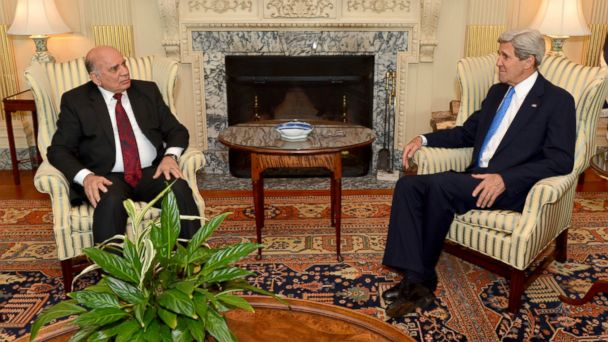Kurds Push for Independence From Baghdad as US Pushes Back

U.S. Secretary of State John Kerry meets with Chief of Staff to the Presidency of the Kurdistan Regional Government Dr. Fuad Hussein at the U.S. Department of State in Washington, July 2, 2014.
Leaders from the semiautonomous Kurdish region in Iraq are in Washington this week telling the Obama administration that it must accept the fact that the Kurds are pursuing full independence, even if the U.S. prefers that they defer any such moves until the political situation in Baghdad is stabilized.
Fouad Hussein, chief of staff to the Kurdish president Massoud Barzani, told reporters Thursday that an independent Kurdistan will soon exist as a self-sufficient country or within a confederation with Baghdad, but that given the sectarian political divisions there as well as the recent incursion of the Sunni militant group ISIS, "Iraq" as a unified country exists in name only.
"If we can stay together it must be on the basis of the new reality. And new reality has to do with the fact that Kurdistan is now independent," Hussein said, briefing reporters at the Kurdish Regional Government's DC offices.
He also said that American officials with whom he and the Kurdish foreign minister Falah Bakir met so far have been very receptive to that message. The men convened with Secretary of State John Kerry Wednesday and were meeting with National Security Council officials at the White House Thursday.
Hussein painted Kurdistan as a self-sufficient oasis in an otherwise bleak landscape: the Kurds have their own army, the pesh merga, and the Kurdish oil supply allows them economic independence from Baghdad. Meanwhile, the Shiites maintain de facto control of Baghdad, which is in political shambles, and the rest of the country is under the thumb of ISIS.
So, he continued, the Kurds, which will soon hold a referendum on the question of independence, are willing to continue cooperating with Baghdad - but don't need to.
"If they can further work together as two confederations, under the name of one country, that can be possible," he said. "But if we cannot reach that understanding with them, then why we must go back to a failed state?"
Hussein added that the Kurds do not want to abandon the political process that is ongoing in Baghdad - but that after the Kurdish referendum, which was announced Wednesday but has yet to be scheduled, they would re-evaluate their relationship with the new central Iraqi government - but the fact that one hasn't even been formed yet is exactly the reason why the Obama administration hasn't appeared to be keen on the Kurds' idea.
The White House and State Department have been urging the Kurds to defer plans for "self-determination" under the theory that a united Baghdad government with Sunnis, Shias and Kurds is best equipped to counter the ISIS threat.
During Thursday's White House briefing, Press Secretary Josh Earnest seemed to reiterate that view: "We continue to believe that Iraq is stronger if it's united, and that's why the United States continues to support an Iraq that is democratic, pluralistic and unified, and we're going to continue to urge all parties in Iraq to continue working together toward that objective."
And during Kerry's visit to the Kurdish capital of Irbil last week, a senior administration official said he also sent a message for the Kurds to put aside their aspirations for an independent state in the interest of immediate security: "'Whatever your aspirations are for your future, your interests now in the near-term are for a stable, sovereign and unified Iraq," the official told reporters after Kerry's meeting with Kurdish President Massoud Barzani.
Hussein seemed to acknowledge Thursday that the Kurds and the United States don't see exactly eye-to-eye on the timing of the Kurds' pursuit of independence from the rest of Iraq.
"Perhaps as far as the timetable, there are differences," he said. Of the Kurdish position, he added, "We understand that we can start both [processes] at the same time."
But Hussein made clear that the Kurds would not wait for the United States to get on board before Barzani held the referendum or acted on its results.
"It is a kind of advice," Hussein said of Kerry and other's requests that the Kurds focus only on the process in Baghdad for now.
The Kurds are asking for American help with the influx of refugees from unrest in Syria as well as elsewhere within Iraq, but Hussein said the main goal of this trip to D.C. is to explain their plans to the Obama administration.
"We are here to inform them about the new reality. We are here to say that this new reality will demand a new policy," he said, adding that he believes the Americans will come around to this new normal.
"We have got a new situation. And I think gradually the Americans understand that," he said.